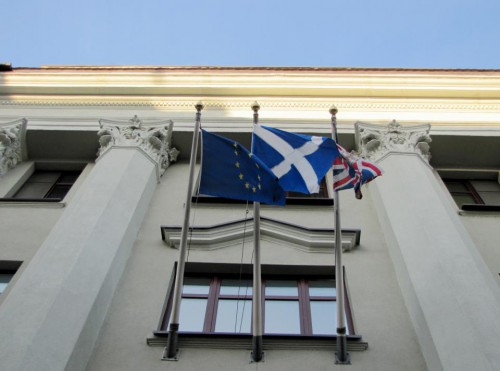3rd October 2014
Consent
Political life has been fascinating in the last few weeks in Britain. I was lucky enough to be in London in mid-September and watched, listened and read lots from the British media about the Scottish referendum.
Like any good contest, the outcome was not certain. There was lively debate and on the day, a high turnout. Scotland was buzzing, and showing what democracy is all about.
At the heart of the debate was a fundamental principle – that of consent.
As I set out in my very first blog, the English language is a hybrid language of many words with the same, or very similar, meanings. Understanding the difference between them can be difficult, and often depends on the context. This is the case with “consent”.
The main meaning of consent is “permission” or “agreement” and which, my colleagues tell me, can be translated into Russian as “согласие” or “рашрешение”. Unusually, the word has the same spelling for both the noun and the verb – and is most often used in a sentence such as “I consent (to allow something to happen)” or “I give my consent (to allow something to happen)”.
Consent is used in many of our laws – as in the principle of “giving consent”. Let me explain the history as to how this came about.
An Anglo-Norman
The origin of the idea comes from the middle ages when one of England’s less successful kings was encountering failure in both war and government. King John angered many of his barons by exercising his power arbitrarily especially in demanding taxes. This is the period of the legendary English hero Robin Hood (who “stole from the rich to give to the poor”, supposedly at the time when John was still a Prince).
The barons met the king at Runnymede where Anglo-Saxon kings had previously held their witan, an early form of parliament. They forced him to accept a written document in which he pledged to protect certain liberties and accept that there were limits to his power. In other words, he recognised that others had rights and that, despite being king, he was not above the law.
That text was Magna Carta, to use the Latin name in which the document was written in 1215 (in English, the Great Charter). The most important principle it set down was that no one could be punished except through the law of the land. The barons had initially only intended the principle to be applied to them. Over time the principle became universal.
The word “consent” was used in the first versions of the Charter in English which was emerging as a hybrid of language of Anglo-Saxon and French at that time. A version of the Charter was eventually adopted as a formal law in 1297 by a king who needed to raise taxes, which entrenched the principle of taxation by consent.
Consent of the governed
The Charter didn’t always succeed in limiting the power of English kings. But it established the idea of the limit of a ruler’s power. It influenced the thinking of those opposed to the arbitrary use of royal power in the Civil War of 1642-51 – when supporters of parliament – as representatives of the people – defeated (and executed) an autocratic King.
The idea was taken by the first British settlers to America. They came to resent being subject to British laws and taxes, and wanted “no taxation without representation”. When they drew up their declaration of independence, they included the phrase that “… government exists to secure the rights of the people and must be based on the consent of the governed”.
Different traditions and jurisdictions
The rights of the individual and limits to state power were gradually enshrined in our law. We had an evolution towards the principle of universal adult suffrage for governments to be chosen through the democratic process. Other countries came to democracy very differently.
I am very aware the histories of the states of which Belarus used to be a part are very different. There was a period in the late middle ages, when Magdeburg rights were enshrined for many towns including some in today’s Belarus. But they were for towns and weren’t applied universally.
We will be celebrating 800 years of Magna Carta next year, and will be holding a global law summit to “commemorate, celebrate and embrace 800 years of legal history”.
In fact, there has just been an important example of the principle of consent being applied.
It may surprise Belarusian readers but the legal system is different in Scotland, from that of England and Wales. Scotland didn’t have a Charter (Ireland, which was intermittently subject to the English crown, had its own Great Charter issued in 1216).
However, the Scottish referendum was the embodiment of that principle set by the barons at Runnymede 799 years ago: that people should only be ruled with their consent.

Dear Bruce ,
there ‘s to me once again 1 K-Sentence in yr. clever report : ” …at the heart ….was fundamental principle – the consent..”.
Plus & notable : Scotland and England were showing the world of what a living & honest working democracy can offer to it ‘s people. I wished some other UN-Nations were able to “offer” such benefits to their own folks too.Nevertheless : I ‘m really glad that the majority of the Scottish vote for “NO”!Interesting to read were also yr. lines that you can ‘t compare the legal system in Scottland withe the one in England or Wales.But : what ’bout this system in N.I., Ulster? To conclude : reading yr . article was like a trip into the past. Meeting Robin Hood & king John. Just great to read.
Best wishes, take care , & a peaceful weekend,
liebste Grüßle, pass auf Dich auf & oin friedsames Wochenendle,
Ingo-Steven , Stuttgart